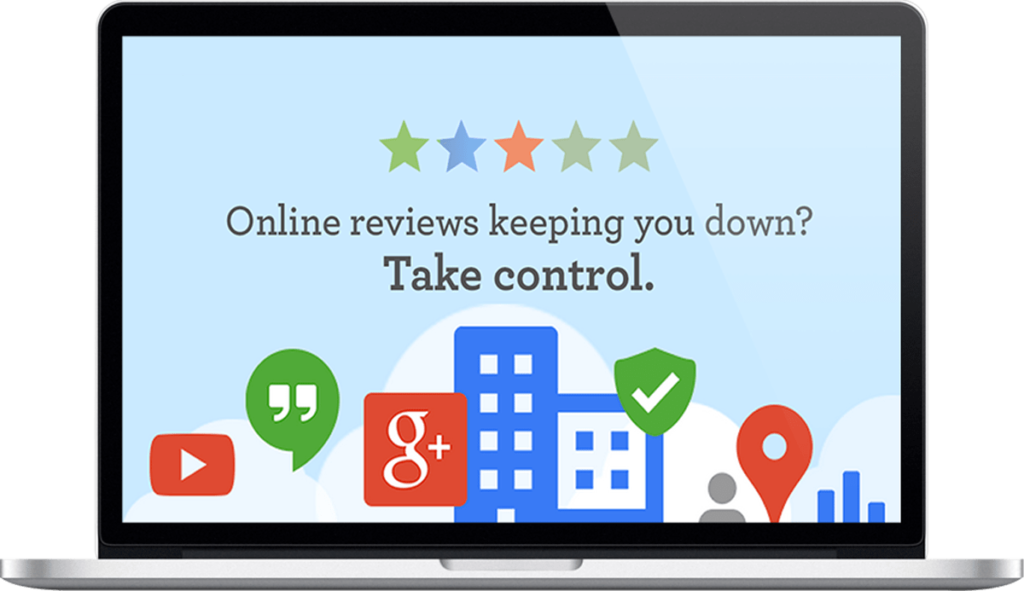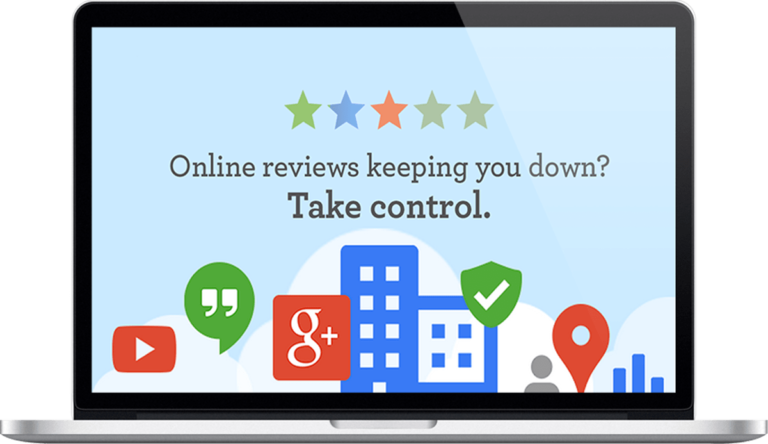Discover why it is Vital To Protect And Manage Your Online Reputation
Online customer reviews are on the rise. Customers are reviewing businesses on directories like Yelp, and Google+ Local. In addition, customers and even prospects are writing about their experiences on social media sites like Twitter, Facebook, and LinkedIn.
Some of these posts and reviews are glowingly positive, while others are very negative, which could seriously damage a business.
While some of the reviews are warranted, based on real experiences, others are unjustified rants from disgruntled or outright crazy people…and even competitors seeking to destroy the competition.
Unfortunately, this means you can no longer ignore your online reputation. If you serve and interact with customers who have access to the internet (that’s just about everyone nowadays), then you need to monitor and respond to what is being said about your business online.
At some point, people are going to mention your business, your brand, your products, and/or your services online and you need to know what they are saying.
The fact is, most potential customers will “Google” you and your business before picking up the phone to call you or come into your store. Your online presence will either be their first impression of you or they’ll be doing a quick background check. Either way, it’s going to affect their decision to contact you or do business with you so you can’t afford to ignore it.
What happens when a prospect searches for your business?
Do you know what pops up in the search results? What if they search for “[your business name] + reviews”?
Or what about “[your product/service name] + scam”? Try a few of these searches in Google and see if a prospect would be impressed or hesitant after viewing the results. You may be shocked to see what some people write about you online.
Plus, now that Google is highlighting reviews and five star ratings in the search results it’s almost impossible to miss customer reviews. When I personally search for a nearby restaurant or service provider, I can’t help but select businesses that have more favorable reviews. It’s human nature to look at other people’s feedback to make the process of choosing a business much easier.
Research has shown that all humans use social signals to make faster decisions. For example, if you walk by two restaurants and one is full of diners, while the other is empty, then which one will you immediately believe has higher quality food? Obviously the one with more people, and this same process happens online millions of times every day. Potential customers intuitively believe businesses with more reviews and more comments will provide better products or services.
CAN YOU REALLY CONTROL YOUR REPUTATION?
Hopefully you now understand how critically important your online reputation is for your business.
However you may believe there’s nothing you can do about it. How can you possibly force customers to give you positive reviews or stop them from posting negative comments? Besides, Google controls what shows up in the search results, so why even bother? There’s nothing you as a business owner can do about it – right?
If this is how you feel, we understand because it is a common belief among business owners, but it’s not 100% true. While you can’t force positive reviews and you can’t completely stop negative reviews, you can significantly influence this behavior and how it affects your business. It all starts within your business, which you do control. We’ll talk more about this in a minute.
And while it’s true Google does control the search results, there are some tricks to make sure only the webpages you want will show up for your business name, your products, and/or your services. Again, we’ll cover these tactics later in this guide.
Online reputation management can be broken down into two strategies:
1. Offense
2. Defense
Offensive strategies are the proactive activities you can do both within your business and online to influence your online reputation. And defensive strategies are the reactive activities.
Both offense and defense are critical to manage your online reputation, and ensure potential customers do not get turned off by negative reviews or comments.
The best defense is offense
In sports, there’s a saying, “the best defense is a great offense,” and the same is true with online reputation management. If you are proactive and launch an aggressive offensive attack, then you’ll greatly reduce your need to be reactive, or play defense.
Here are the three offensive strategies I recommend for every business:
1. Make Your Reputation a Priority
2. Control Google’s First Page
3. Get Consistent Positive Reviews
MAKE YOUR REPUTATION A PRIORITY
We touched on this earlier in the guide. The first step to managing your online reputation is to make your reputation a priority within your online business.
You control how you treat prospects and customers, and everything online is a reaction from those mostly “offline” experiences (i.e. over the phone or in-person at your store).
Think about what kind of online reputation you would like to have: How do you want your customers to think about your company after doing business with you? How should a prospect feel the first time call she calls you or comes into your office?
Take some time to write down some words that you would like to hear when a prospect or customer describes your business. For example, “responsive” or “easy to reach” or “friendly” may be a top priority for you. Or maybe on-time delivery, or pain free procedures, or hassle free service, are more important for you. The exact words will be specific to your type of business and how your business is positioned in the marketplace.
The next step is to put systems in place to ensure every prospect and every customer has the experience you want them to have. Here are some examples of systems you may want to create in your business:
“YOUR BUSINESS” MARKETING ACTION GUIDE
• Create scripts for in-bound and out-bound phone calls
• Create scripts for in-store or in-office conversations with prospects
• Create a process for delivering the final product or service to the customer to maximize satisfaction.
• Create a follow-up process to survey customers after you delivered your product or service to gauge satisfaction.
As you can see, the goal here is to take a close look at your business and see how you can positively influence the customer experience. Without this first critical step, you can’t expect to have a solid online reputation. It all starts from within your business, which again, you completely control.
CONTROL GOOGLE’S FIRST PAGE
The next step in your offensive strategy is to control Google’s first page when prospects search for your business name, your products, and/or your services. When prospects search your company name online, you want them to see websites you own or pages and content that you created.
With correct search optimization you will be able to better control as closely as possible all of the content relating to your company name. That way potential customers will only see webpages that present your business in a favorable way. There won’t be any bad comments popping up and negatively influencing your prospects and customers.
Another advantage is the fact that you can edit all of these webpages, and can include links to your main website. That way, there’s a very good chance no matter which search result the prospect clicks on, they will eventually end up on your main website.
In most cases, this is relatively easy to do. First, create social media profiles with your brand name and those will typically rank on the first page of Google. Then, issue press releases with your brand name in the title of the press release, and those will usually rank on the first page as well. This is called the “Piggyback SEO” technique because you are piggybacking on the other websites’ ability to rank high in Google (i.e. Facebook, YouTube, PRWeb, Webwire, etc.).
GET CONSISTENT POSITIVE REVIEWS
The third offensive strategy is to get positive online reviews on a consistent basis. As long as the majority of your reviews and comments online are positive, then prospects will feel confident the one or two negative reviews are either fake or from unreasonable customers or your competition. It’s important to proactively request reviews month after month, so your positive reviews outweigh any negative reviews.
This is also critical if you are a local business, because people will be looking at reviews on Google+ Local as well as sites like Yelp, Bing Local, and Yahoo Local.
So how exactly do you get positive reviews online?
Well again, it all starts within your business — by providing high-quality products and services. And if you provide high-quality products and services, then you’ll naturally get some reviews without asking for them at all.
However, to get lots of reviews on a consistent basis, you will to be prepared to ask for them. The vast majority of your customers will not take time out of their busy schedules to give you an online review without a little nudge in the right direction, but in most cases they will be very happy to do so.
An effective way to do it is to ask (or survey) EVERY customer about their experience doing business with you. You can do this in-person, over the phone, or via email. Then if you determine they’re happy with you, ask them to post a review for your business online. Try to ask when you know your customer is likely to be the happiest with your business. That will significantly increase the number of positive reviews you get online.
Also, when you ask for an online review, it’s critical to make it as simple as possible for your customer to post a review online. Send your customer straight to the page where you want them to give you a review. For example, send them to your Google+ Local page and don’t make them find it themselves.
Email is one of the easiest ways to do this because you can include a link to your review page right in the email. Or give them a physical printed card like the one above that includes a link to your review page as well as a QR code that mobile phone users can use.
And finally, you must follow up after you ask for the review.
Even if customers want to give you a review, they may just forget. We’ve all done it ourselves. We might have been really happy with some businesses to the point where we will go out of our way to write a positive review online. However, if we don’t do it right away, then we usually forget, and it never happens. And that’s exactly what’s going to happen with your customers if you do not follow up with them. Use a friendly reminder email or phone call to get them to take action more quickly and submit a positive review for you.
YOU STILL NEED TO PLAY DEFENSE
Even with the best offensive tactics, you will inevitably still need to play some defense to protect your online reputation.
Let’s assume you provide high-quality products and services and you already have a solid reputation from all of your proactive online reputation management tactics. As you grow you’ll eventually get some disgruntled (or outright crazy) customers. And there will be a time when you get some complaints and bad reviews online. There’s just no way around that fact. No business is immune unless your customers don’t have access to the Internet.
As we mentioned earlier, a negative review is OK if you have a lot of other positive reviews. But you must respond to the negative review. And that’s why you need to play some defense.
The three defensive strategies are easy to remember by the acronym, MRI:
1. Monitor
2. Respond
3. Inspect
The only way to know if people are commenting or posting reviews about your business is to monitor your online reputation. We recommend three tools for monitoring:
First, you can simply Google your name and review the websites that show up on the first page. This is the most basic method to track your reputation and it’s something you should check on a monthly basis to make sure there are no negative websites popping up. Remember, if you see something negative, then your prospects and customers will certainly see it as well.
Second, go to http://alerts.google.com to set up Google Alerts for your business name, your products and services, and even your personal name. Google will then send you an email whenever someone mentions you on a webpage. This is a great way to passively monitor your reputation because Google does all the hard work of finding the phrases you want to track.
Third, go to http://socialmention.com and run some searches to see if you can find any more people talking about you on other social media websites.
Respond
Once you have your monitoring system set up, then it’s only a matter of time before you find some people talking about your business. When that happens, it’s critical to respond as quickly as possible.
Sometimes complaints are merely misunderstandings. So if you respond promptly to clarify the issue, then the person who made the post may edit it or remove it altogether. Speed is critical here because it shows you care about customer service. You can respond “off the record” via phone or email, or you can respond directly to the post by making a comment on the website. I typically recommend both.
Keep in mind that a response on the website will be read by future customers so you want to make sure you write clearly so everything you say is interpreted correctly. Then if possible, follow up via phone or email to resolve the problem and ensure no future comments will be posted online.
Never, ever get defensive or argue with the person posting the negative review. That will only make things worse. Instead, try to offer whatever you can to make it up to the prospect or customer. For example, if the customer was not satisfied, then offer to replace the product or redo the service if that’s reasonable.
Remember, your goal by responding publicly is to give any future prospects confidence you actually care about customer satisfaction. If you let a negative comment sit there with no response, then you give the impression you simply don’t care. That will almost certainly hurt future sales.
Identify
After you respond, then the final step is to identify the root cause of the problem. Its possible the negative review or comment was completely unwarranted and in that case there’s nothing to do at this stage. However, if you’re dealing with chronic complaints and reputation problems, then I recommend you deal with the problem at the source.
For example, answer these questions:
• Is there a gap between your customers’ expectations and your delivery?
• Are there certain products or services that are letting people down?
• Are there specific types of customers who are continually dissatisfied?
• Are there individual employees who are causing customer problems?
Try to identify the root cause of the negative reviews, and take whatever action is necessary to prevent future unfavorable posts.
In some cases, identifying the root cause may not be easy, and it may require some big changes. It may be uncomfortable to dig into the root causes of customer complaints. But it’s well worth it in the long run to have happy customers. One happy customer can provide multiple referrals and repeat purchases well into the future.
Alternatively, one unhappy customer will not only provide zero referrals and zero repeat business, but they may actually go out of their way to tell people to avoid your business. So clearly, it’s worth the time investment to find the root cause and fix whatever may be causing your reputation problems!
Don’t Let One Unfair Comment Destroy Your Business
Just one unanswered or poorly handled response to an unfair negative review could literally destroy your business.
We are passionate about helping companies just like yours, to protect their hard earned good reputation on the Internet. We can do the same for your business. Don’t put this off thinking it will never happen to you. Call us today before it is too late.




